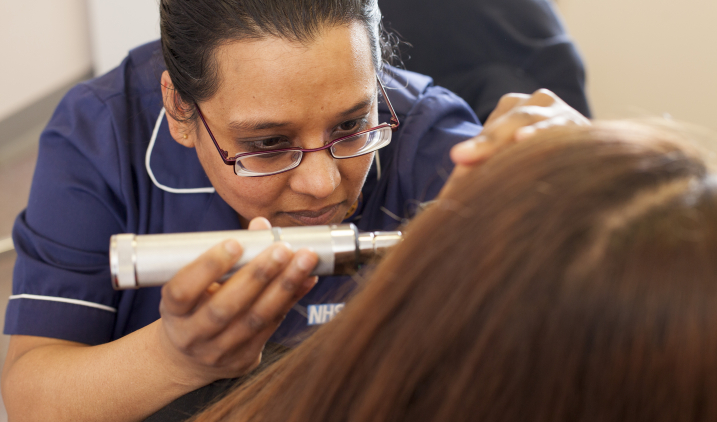Assistant practitioner
Assistant practitioners are experienced staff working in support roles, alongside registered healthcare professionals.
This page has information on the role of assistant practitioners, including entry requirements and skills needed.
Working life
Assistant practitioners (sometime known as associate practitioners) have skills and experience in a particular area of clinical practice. Although they are not registered healthcare professionals they develop a high level of knowledge and skill through their experience and training.

Assistant practitioners work across the NHS in most departments so you could be working in:
- respiratory medicine, testing and assessing lung function
- occupational therapy, assessing people’s need for aids and equipment at home
- an operating theatre area, scrubbing and assisting in surgical and other procedures, or monitoring patients recovering from surgery
- providing personal, social, therapeutic and rehabilitative care (e.g. bowel care and management, catheter insertions etc.)
- dietetics, encouraging people to make healthier food choices
- biomedical science, analysing samples in a lab
- mental health services, supporting adults or young people with mental health issues
- stroke rehabilitation, helping people recover in their own homes
- emergency medicine, treating patients so they can return home as soon as possible
- radiography, helping to diagnose or treat a patient's illness
- a health centre or GP surgery, changing dressings and monitoring medication
- hearing services, as part of the audiology team
As an assistant practitioner, you'll always work under the direction of a health professional such as a nurse, dietitian, physiotherapist, podiatrist or biomedical scientist. Your level of training and experience means you can often work alone, without direct supervision. You'll carry out agreed procedures, referring to a professional for guidance when necessary.
You could work in hospitals, clinics or in the community eg GP surgeries. You may visit patients in their homes or in residential care. You'll work closely with other healthcare staff and have a lot of contact with patients.
You may mentor healthcare assistants, trainee assistant practitioners and student nurses.
Pay and benefits
As an assistant practitioner, you'll usually be paid at Band 4 of Agenda for Change. There are sometimes opportunities for trainee assistant practitioners at AfC band 3. You'll usually work standard hours of around 37.5 a week and may work shifts, which could involve nights, early starts, evenings and weekends.
You’ll also have access to our generous pension scheme and health service discounts, as well as 27 days of annual leave, plus bank holidays, which increases the longer you’re in service.
Entry requirements
To train as an assistant practitioner, you have to be working in the NHS, often in a clinical support role such as healthcare assistant, dietetic assistant or maternity support worker.
As well as healthcare experience, trainee assistant practitioners usually have a relevant healthcare qualification at level 3, such as a BTEC, CACHE, relevant healthcare apprenticeship or Access to HE course.
Your skills and responsibilities will vary, depending on the care setting you work in. You’ll need to demonstrate the values and behaviours of the NHS Constitution and a knowledge of physical health, mental health and illness prevention, as well as more advanced knowledge, depending on your care setting.
Personal characteristics and skills needed
Assistant practitioners need to be:
- caring and kind
- confident with using lifting equipment
- willing to be hands-on with patients
- able to follow instructions and procedures
- able to work in a team but use their own initiative
- able to explain procedures to patients
- careful and methodical
You'll also need effective:
- communication skills, including listening
- organisational skills
- observational skills
Training and development
You will be given the training you need for the job, including an introduction to the department and its procedures. Assistant practitioners usually follow a therapy or nursing training pathway and undertake a level 5 two-year foundation degree in health or social care (which may be available as an apprenticeship programme) or Higher National Diploma (HND).
Assistant practitioners have to keep their skills and knowledge up to date with regular training.
Assistant practitioners can become members of the Royal College of Nursing (RCN) or the professional association for their speciality, for example The Association of UK Dietitians or the Chartered Society of Physiotherapy.
Where the role can lead
You could become a senior assistant practitioner, supervising the work of other clinical support staff. With experience, and as long as you can demonstrate that you have the academic ability to study at degree level, you could apply to train as a healthcare professional such as a nurse, radiographer, dietitian, physiotherapist, podiatrist or healthcare science practitioner. Depending on the assistant practitioner programme that you completed, you may be able to do a shortened degree programme to qualify in one of these professions.